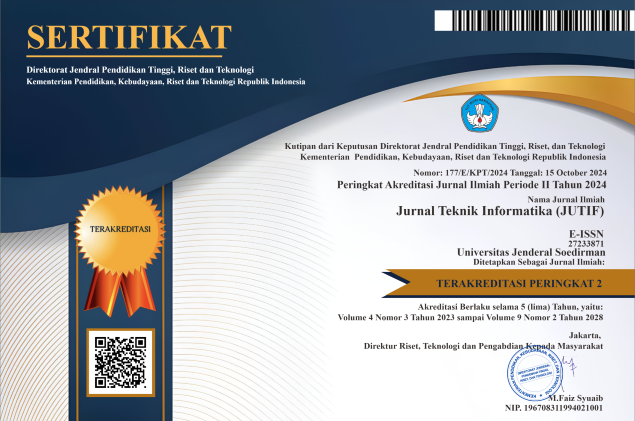DEVELOPMENT OF SCHEDULING SYSTEM WITH GENETIC ALGORITHM IN WEBSITE-BASED SMK NEGERI 1 SINE
DOI:
https://doi.org/10.52436/1.jutif.2023.4.4.784Keywords:
genetic algorithm, optimization, scheduling systemAbstract
Scheduling is an information that has limited conditions that must be met. Preparation of the schedule will take quite a long time if it is done using conventional media such as writing on paper or books. Scheduling optimization is needed to provide effectiveness and efficiency so that the implementation of learning activities can run more optimally. The genetic algorithm approach method is used to get the optimum schedule. This algorithm produces the best combination for subject pairs and teaching teachers as a whole by determining the initial population and initializing the chromosomes, determining the fitness value, then carrying out crossover selection, and carrying out mutations to produce the best fitness value which will be used to determine the final value of scheduling. The results of the entire algorithm process are consistent with the original prediction data, and the same teacher is not scheduled to teach more than once at the same time. The results of the subject scheduling process using the genetic algorithm obtain a fairly good optimization in subject scheduling.
Downloads
References
D. Oktarina and A. Hajjah, “Perancangan Sistem Penjadwalan Seminar Proposal dan Sidang Skripsi dengan Metode Algoritma Genetika,” JOISIE (Journal Of Information Systems And Informatics Engineering), vol. 3, no. 1, pp. 32–40, Jul. 2019, doi: 10.35145/JOISIE.V3I1.421.
Ç. Alabaş Uslu, B. Dengiz, C. Ağlan, and I. Sabuncuoğlu, “Modified self-adaptive local search algorithm for a biobjective permutation flowshop scheduling problem,” Turkish Journal of Electrical Engineering and Computer Sciences, vol. 27, no. 4, pp. 2730–2745, Jan. 2019, doi: 10.3906/elk-1811-40.
X. Geng and M. Hu, “Simulated Annealing Method-Based Flight Schedule Optimization in Multiairport Systems,” Math Probl Eng, vol. 2020, 2020, doi: 10.1155/2020/4731918.
T. Sutrisno, “PENERAPAN ALGORITMA TABU SEARCH DALAM PROSES PENJADWALAN PADA APLIKASI PENJADWALAN KURSUS MOBIL BERBASIS ANDROID,” Buffer Informatika, vol. 4, no. 2, pp. 25–30, Oct. 2018, doi: 10.25134/BUFFER.V4I2.1471.
B. Wang et al., “Senior high school course scheduling using genetic algorithm,” J Phys Conf Ser, vol. 953, no. 1, p. 012067, Jan. 2018, doi: 10.1088/1742-6596/953/1/012067.
A. Penelitian Pengembangan Algoritma Genetika dengan Pendekatan Repetitive Random untuk Penjadwalan Ujian Pendadaran Proyek Tugas Akhir Adityo Permana Wibowo and D. Avianto, “Pengembangan Algoritma Genetika dengan Pendekatan Repetitive Random untuk Penjadwalan Ujian Pendadaran Proyek Tugas Akhir,” Jurnal Nasional Teknologi dan Sistem Informasi, vol. 7, no. 1, pp. 35–43, Jun. 2021, doi: 10.25077/TEKNOSI.V7I1.2021.35-43.
J. Xu, “Improved Genetic Algorithm to Solve the Scheduling Problem of College English Courses,” Complexity, vol. 2021, 2021, doi: 10.1155/2021/7252719.
S. Hikmawan, W. Gata, N. Mandiri, J. Damai No, W. Jati Barat, and J. Selatan, “Algoritma Genetika dengan Mutasi Terbatas untuk Penjadwalan Perkuliahan,” Jurnal Kajian Ilmiah, vol. 21, no. 2, pp. 229–242, May 2021, doi: 10.31599/JKI.V21I2.520.
A. Rajagopalan, D. R. Modale, and R. Senthilkumar, “Optimal Scheduling of Tasks in Cloud Computing Using Hybrid Firefly-Genetic Algorithm,” pp. 678–687, 2020, doi: 10.1007/978-3-030-24318-0_77.
D. Nasien and A. Andi, “Optimization of Genetic Algorithm in Courses Scheduling,” IT Journal Research and Development, vol. 6, no. 2, pp. 151–161, Feb. 2022, doi: 10.25299/ITJRD.2022.7896.
J. Blazewicz, H. Eiselt, G. Finke, G. Laporte, and J. Weglarz, “Scheduling tasks and vehicles in a flexible manufacturing system,” International Journal of Flexible Manufacturing Systems, vol. 4, no. 1, 1991.
D. C. P. B.-S. N. M. Jakarta, “Optimasi Algoritma Naïve Bayes dengan Menggunakan Algoritma Genetika untuk Prediksi Kesuburan (Fertility),” EVOLUSI : Jurnal Sains dan Manajemen, vol. 4, no. 1, Mar. 2016, doi: 10.31294/EVOLUSI.V4I1.3397.
M. Algoritma, G. Untuk, P. Permasalahan, P. Pelajaran, S. Rahman Erama, and R. Wardoyo, “Modifikasi Algoritma Genetika untuk Penyelesaian Permasalahan Penjadwalan Pelajaran Sekolah,” IJCCS (Indonesian Journal of Computing and Cybernetics Systems), vol. 8, no. 2, pp. 111–120, Jul. 2014, doi: 10.22146/IJCCS.6539.
S. Masturoh, D. Wijayanti, and A. Prasetyo, “SISTEM INFORMASI AKADEMIK BERBASIS WEB MENGGUNAKAN MODEL WATERFALL PADA SMK ITENAS KARAWANG,” Jurnal Informatika, vol. 6, no. 1, pp. 62–68, Apr. 2019, doi: 10.31294/JI.V6I1.5375.
F. Risyda, … Y. N.-I., and undefined 2019, “Rancang Bangun Sistem Informasi Akademik Pada Sekolah Smk Pgri 28 Dengan Metode Waterfall,” journal.universitassuryadarma.ac.id, 2019, Accessed: May 16, 2022. [Online]. Available: https://journal.universitassuryadarma.ac.id/index.php/jsi/article/view/285
S. A. Indutoro and E. Sudarmilah, “WEB-BASED ACADEMIC INFORMATION SYSTEM OF YAPI SUNNI TEGALGONDO ISLAMIC BOARDING SCHOOL USING WATERFALL METHOD TO MANAGE STUDENTS ACADEMIC DATA,” Jurnal Teknik Informatika (Jutif), vol. 3, no. 1, pp. 49–59, Feb. 2022, doi: 10.20884/1.JUTIF.2022.3.1.127.
D. Wira, T. Putra, and R. Andriani, “Unified Modelling Language (UML) dalam Perancangan Sistem Informasi Permohonan Pembayaran Restitusi SPPD,” Jurnal Teknoif Teknik Informatika Institut Teknologi Padang, vol. 7, no. 1, pp. 32–39, Apr. 2019, doi: 10.21063/JTIF.2019.V7.1.32-39.
F. Sonata and V. Winda Sari, “Pemanfaatan UML (Unified Modeling Language) Dalam Perancangan Sistem Informasi E-Commerce Jenis Customer-To-Customer,” Jurnal Komunika: Jurnal Komunikasi, Media dan Informatika, vol. 8, no. 1, pp. 22–31, Jun. 2019, doi: 10.31504/KOMUNIKA.V8I1.1832.



























